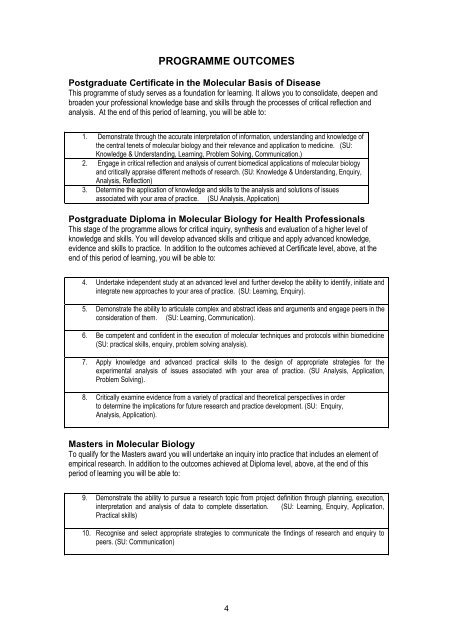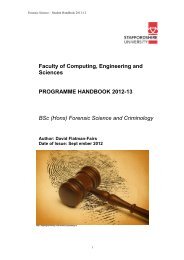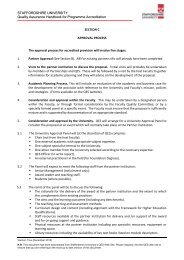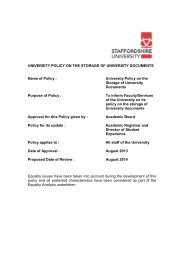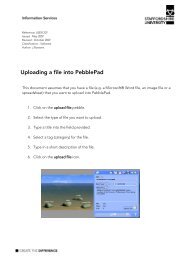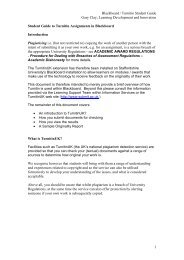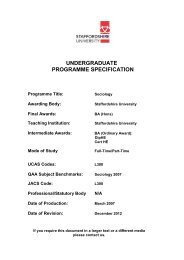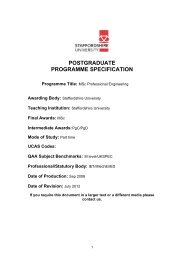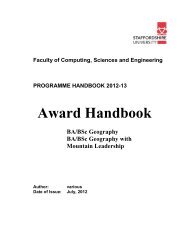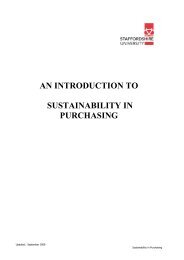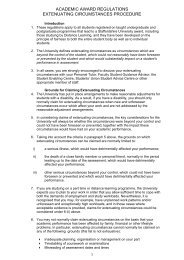MSc Molecular Biology Programme Specification - Staffordshire ...
MSc Molecular Biology Programme Specification - Staffordshire ...
MSc Molecular Biology Programme Specification - Staffordshire ...
Create successful ePaper yourself
Turn your PDF publications into a flip-book with our unique Google optimized e-Paper software.
PROGRAMME OUTCOMES<br />
Postgraduate Certificate in the <strong>Molecular</strong> Basis of Disease<br />
This programme of study serves as a foundation for learning. It allows you to consolidate, deepen and<br />
broaden your professional knowledge base and skills through the processes of critical reflection and<br />
analysis. At the end of this period of learning, you will be able to:<br />
1. Demonstrate through the accurate interpretation of information, understanding and knowledge of<br />
the central tenets of molecular biology and their relevance and application to medicine. (SU:<br />
Knowledge & Understanding, Learning, Problem Solving, Communication.)<br />
2. Engage in critical reflection and analysis of current biomedical applications of molecular biology<br />
and critically appraise different methods of research. (SU: Knowledge & Understanding, Enquiry,<br />
Analysis, Reflection)<br />
3. Determine the application of knowledge and skills to the analysis and solutions of issues<br />
associated with your area of practice. (SU Analysis, Application)<br />
Postgraduate Diploma in <strong>Molecular</strong> <strong>Biology</strong> for Health Professionals<br />
This stage of the programme allows for critical inquiry, synthesis and evaluation of a higher level of<br />
knowledge and skills. You will develop advanced skills and critique and apply advanced knowledge,<br />
evidence and skills to practice. In addition to the outcomes achieved at Certificate level, above, at the<br />
end of this period of learning, you will be able to:<br />
4. Undertake independent study at an advanced level and further develop the ability to identify, initiate and<br />
integrate new approaches to your area of practice. (SU: Learning, Enquiry).<br />
5. Demonstrate the ability to articulate complex and abstract ideas and arguments and engage peers in the<br />
consideration of them. (SU: Learning, Communication).<br />
6. Be competent and confident in the execution of molecular techniques and protocols within biomedicine<br />
(SU: practical skills, enquiry, problem solving analysis).<br />
7. Apply knowledge and advanced practical skills to the design of appropriate strategies for the<br />
experimental analysis of issues associated with your area of practice. (SU Analysis, Application,<br />
Problem Solving).<br />
8. Critically examine evidence from a variety of practical and theoretical perspectives in order<br />
to determine the implications for future research and practice development. (SU: Enquiry,<br />
Analysis, Application).<br />
Masters in <strong>Molecular</strong> <strong>Biology</strong><br />
To qualify for the Masters award you will undertake an inquiry into practice that includes an element of<br />
empirical research. In addition to the outcomes achieved at Diploma level, above, at the end of this<br />
period of learning you will be able to:<br />
9. Demonstrate the ability to pursue a research topic from project definition through planning, execution,<br />
interpretation and analysis of data to complete dissertation. (SU: Learning, Enquiry, Application,<br />
Practical skills)<br />
10. Recognise and select appropriate strategies to communicate the findings of research and enquiry to<br />
peers. (SU: Communication)<br />
4


